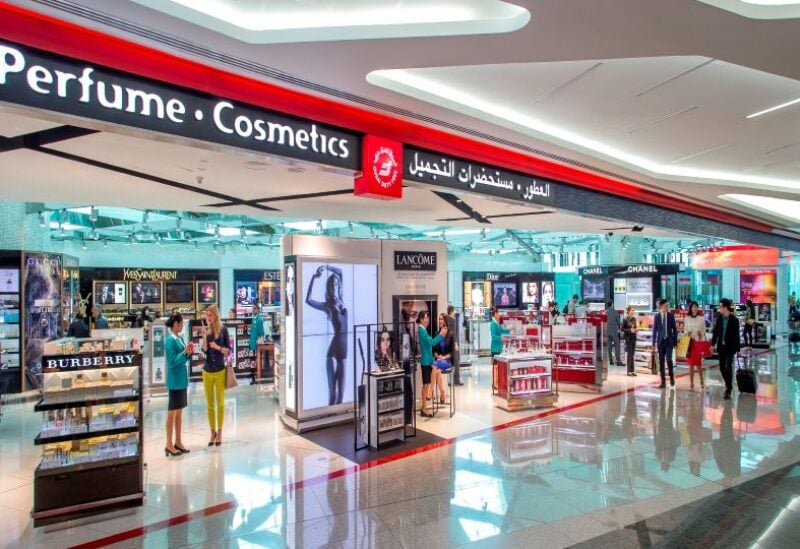
Dubai Duty Free
Dubai Duty Free expects yearly revenues to rise 40% to Dh5.1 billion ($1.4 billion) in 2022, and it aims to rehire more of its employees left off during the Covid-19 outbreak as passenger traffic at the world’s largest international airport continues to recover.
An inflow of high-spending Russian, Saudi, and Israeli visitors will help improve sales this year, with total average expenditure per passenger expected to approach pre-pandemic levels, according to Colm McLoughlin, executive vice chairman and chief executive of Dubai Duty Free.
“We’ve planned for Dh5.1 billion in sales this year, and we’re optimistic that we’ll meet it,” Mr McLoughlin said in an interview at the company’s headquarters.
“What has returned quite dramatically from ten years ago is Russian traffic, and what has surged significantly last year is Saudi traffic, as well as the new Israeli travel.”
The expected increase in yearly airport retail sales comes as passenger flow via Dubai International Airport began a steady rebound in 2021 from the impacts of the pandemic, which pounded worldwide demand for air travel, and as the hub restored full-service operations.
The emirate’s airport operator increased its prediction for annual passenger traffic beginning in 2021 by two million, forecasting a total of 28.7 million passengers. Dubai Airports anticipates 57 million passengers per year in 2022.
Following the reopening of the final part of Concourse A at Terminal 3 in November, Dubai International Airport is now fully operational after 20 months of limited operations due to the pandemic. The passenger terminal at Dubai World Central, the emirate’s second airport, will reopen in May.
The airport retailer’s annual sales prediction of Dh5.1bn this year is edging closer to its record revenue of Dh7.4bn in 2019.
During the pandemic, an emerging tendency has been a rise in revenues per head to $53 in 2021, up from around $40 in 2019. The amount is presently set at $50.
“We believe the increase in sales is due to individuals not traveling as regularly as they used to, and they’re conserving their buying spree for their trip occasion,” Mr McLoughlin explained. “As a result of not traveling as much, they had saved a little more money than they would have otherwise.”
Penetration rate, a performance parameter in the duty-free industry that gauges the number of passengers sold to by airport retailers, had surpassed 30%.
With business picking up and the airport recovering to full capacity, Dubai Duty Free has recalled 1,500 of its employees who were laid off during the epidemic, bringing its entire headcount to 4,000, according to Mr McLoughlin.
“We’ll call back a few more times,” he added. “We will call back a couple of hundred additional folks at first, and ideally we will continue to do so as the business grows.”
During the pandemic, the firm, like others in the worldwide aviation sector, was forced to lay off employees, reducing its employment by more than half from 6,000 individuals in 2019 to 2,500 workers a year ago.
“We had them on furlough for a long period, then we had to lay people off, some individuals retired, and we paid everyone’s entitlement and indemnity,” he explained. “However, these are the ones we’re contacting.”
In terms of funding, the airport store has no financial obligations this year and is not requesting government aid.
“We’re self-sufficient in financing, so we won’t need bank loans or anything like that,” the seasoned CEO explained. “We have properly stored reserve cash… so we will not be searching for borrowing.”
According to Mr McLoughlin, the Omicron form is less severe than prior variants and that the aviation sector would eventually recover.
“Like the start of a race, the global aviation sector is only waiting to strike back,” he added. “It’ll just happen gradually.”
Returning to pre-pandemic levels of passenger volume will likely take another two years, he predicted, echoing similar projections by the International Air Transportation Association and industry experts.
Meanwhile, Dubai Duty Free has changed its approach to shifting consumer behaviors and tastes throughout the epidemic by providing services like as home delivery and online ordering.
During the pandemic, the firm also took efforts to cut expenses and conserve cash, such as layoffs, avoiding overtime hours, lowering the value of products in its warehouse by half to manage payments, and avoiding extra promotional payments for events.
“We tightened our belts as much as we could, but we didn’t have to borrow money, and we didn’t have to fail on any obligations in any way – and we still don’t,” he explained.
It, like other shops, had a scarcity of some items as the epidemic drove manufacturers to close plants and suspend manufacturing.
However, with Dubai Duty Free anticipating a better year for travel and tourism this year, the company is confident about luring more customers.
“We’re on the right track,” Mr McLoughlin said. “Our results in 2021, as well as our budgetary aspirations for 2022, show and reinforce that we’re on the right road.”